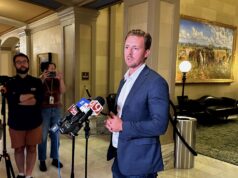(Editor’s note: This story was authored by Paul Monies of Oklahoma Watch and appears here in accordance with the non-profit journalism organization’s republishing terms.)
Vaccination has become a dirty word at the Oklahoma Capitol.
Public health policies that drew little attention for decades are now so politically toxic that few lawmakers want to take a recorded vote on the issue. And fewer still feel comfortable talking about updates to the state’s vaccination schedule or getting rid of certain vaccine exemptions. Even bills mandating vaccine information for adults are shot down as they wend their way through the legislative process.
As Oklahoma joins 25 other states in the worst measles outbreak in a generation, changing the state’s vaccination policies has become the latest third rail of politics. Public health officials appear paralyzed almost to the point of inaction, and many lawmakers beg their colleagues not to sponsor vaccine-related bills that could embolden potential opponents.
Former Sen. Ervin Yen (R-OKC) is a cautionary tale in the standoff. Yen, an Oklahoma City cardiac anesthesiologist, lost in last year’s Republican primary after speaking out pointedly for change in the state’s immunization policies.
Almost a year later, he’s hesitant to blame his loss solely on his pro-vaccination bills but said he has no regrets. His comments and legislation on other public health issues also drew the ire of medical marijuana proponents, midwives and nurses.
“Obviously, trying to educate the public like we were trying to do does not work, and the ‘anti-vaxxers’ are quote, ‘educating’ the public better than government or medicine,” Yen said. “Among legislators, they are afraid of bringing this up because of what happened to me … I don’t think they actually un-elected me, but a lot people think that.”
Yen was elected in 2014 and soon introduced bills that limited exemptions for vaccinations needed for school enrollment. They went nowhere in Yen’s first session. The next year, he authored bills that would have required parents to get information from a doctor before filing for a vaccine exemption. Those failed too, but his efforts drew the attention of a group of parents who believe their children were harmed by vaccinations.
“He decided as a physician to advocate for less exemptions, and that really stirred people up,” said Senate President Pro Tempore Greg Treat (R-OKC).

Liza Greve, president and executive director of Oklahomans for Health and Parental Rights, rejects the “anti-vax” label and said people use the term to cut off debate about the risks of vaccinations. Greve’s group started opposing Yen’s efforts on social media and then grew to grassroots lobbying at the Capitol. Her coalition includes families who say their children were injured by vaccines, people concerned about government overreach and those who are skeptical of the profit motives of pharmaceutical companies and doctors.
Greve, who said her oldest child suffered a vaccine-related injury from the rubella part of the MMR vaccination, said she wants parents to have all the information they need before they vaccinate their children. Her son has a developmental disability and will require care for the rest of his life.
“We’re not about being ‘anti’ anything,” Greve said. “We are pro-safety, pro-parental rights, pro-informed consent and pro-medical privacy. We live in a different generation than our parents and our grandparents where whatever the doctor said is typically what they did.”
Most national medical groups say research is conclusive that vaccines are safe and effective and cause harmful reactions in only a small percentage of those vaccinated. The federal government runs the National Vaccine Injury Compensation Program, which shields pharmaceutical companies from liabilities stemming from vaccine injuries. The program has paid out $4.1 billion in claims since it started in the 1980s. Most of the compensation has gone to adults who were harmed by influenza vaccinations.
Oklahomans for Vaccine and Health Choice, a political action committee chaired by Greve, contributed more than $31,000 to House and Senate campaigns last year, according to state Ethics Commission filings. It gave the maximum amount, $5,000, to Yen’s Republican opponent, Joe Howell, a veterinarian. Howell lost in the general election to Carri Hicks, an Oklahoma City Democrat.
“We were boots on the ground. We were in the district almost every day,” Greve said of Yen’s primary campaign. “We assisted his opponent but we were not alone.”
With Yen gone, Greve said Oklahomans for Health and Parental Rights took less of a defensive stance and backed bills this year dealing with informed consent and vaccine-risk education. By the end of session, just one, HB 2339, made it into law, with Gov. Kevin Stitt signing it May 28. The legislation requires parents to opt in if they want a child vaccinated at school by mobile vaccination units for influenza, measles, human papillomavirus (HPV), meningitis or other communicable diseases.
Greve said the bill was needed because there had been reports of a child vaccinated at school without parental consent. Opponents said the bill would make it harder for poor children to get vaccinations and add another layer of regulation.
“Measles is growing now because we’re adding layers to vaccinations, which is suppressing the amount of people in society that get vaccinated. And it’s not just for them, but for people who can’t get vaccinated for a medical reason – the herd immunity,” said Rep. Jason Dunnington, (D-OKC), before the final House vote on May 23.
Sen. Greg McCortney, (R-Ada), managed to get two of his vaccine bills through the Senate, but they died in the House. SB 924 would have required assisted-living facilities to post information about the flu shot for adult residents. SB 925 proposed requiring school districts to publish data about their vaccination exemptions. Most schools voluntarily report their vaccination and exemption data in an annual kindergarten survey. The school-specific data was released by the state for the first time last month at Oklahoma Watch’s request. But schools aren’t required to fill out the survey, and about half of private schools don’t participate.
McCortney said his school district bill was informational only and didn’t make any changes to the vaccination exemptions themselves.
“Anything dealing with vaccines in children is just such a hot topic that I assume the House just didn’t want to deal with that this year,” McCortney said. “I don’t think that it is possible to get any form of vaccine reform bill through the Legislature, and I don’t intend to try again next year. Even inconsequential vaccine bills are not viable here.”
Privately, some lawmakers question whether those opposed to stricter laws on vaccinations or exemptions can really sway an election. But they say the organized protests and messaging campaigns are definitely creating an appearance of power. A large majority of parents don’t hesitate to have their children immunized and don’t press for changes unless concerns are raised by a major outbreak of disease.
Outside of the Capitol, Greve’s group was vocal about a proposed rule by the Oklahoma State Department of Health to adhere to the vaccination guidance recommended by the Centers for Disease Control and Prevention’s Advisory Council on Immunization Practices. Greve said the council’s members have financial conflicts of interest and adopting its recommendations could lead to additional vaccinations in Oklahoma’s required vaccination schedule.
The Health Department received almost 100 comments on the proposed rule, all of them opposed. The department canceled a planned public hearing and dropped the rule.
“The OSDH decided to discontinue pursuit of this rule promulgation this year, instead taking time to re-evaluate and re-examine alongside stakeholders a more comprehensive approach to the promotion of, and systems ensuring, widespread immunization protections among Oklahomans,” agency spokesman Tony Sellars said in an email.
Dr. Thomas Kuhls, a Norman pediatrician and president of Vaccinate Oklahoma, said it’s unlikely any major changes to the state’s vaccination schedule or exemptions can be made in the current political climate.
“The Legislature is not allowing any anti-vaccine laws or allowing anything to strengthen the vaccine laws,” Kuhls said at a May 21 forum sponsored by Oklahoma Watch. “I think they want the problem to go away because when you talk about parental rights versus public health, it’s always a difficult argument, especially for a politician.”























